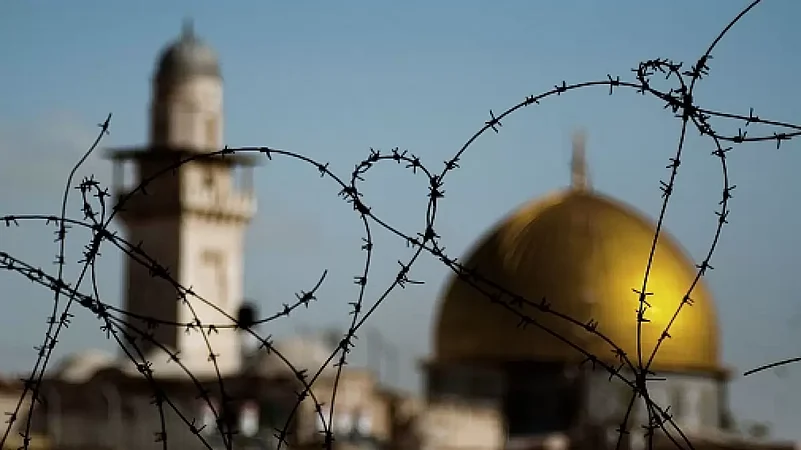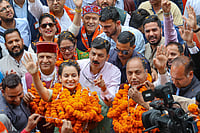The images depicting the suffering of ordinary people amidst the Israel-Hamas War and the increasing attacks are deeply disturbing. The impact of this conflict is becoming increasingly evident on the global stage. It is certain that this power struggle between Muslim and non-Muslim populations will escalate further. However, India has maintained a clear and unwavering stance on this dispute. Wherever terrorism is present, India opposes it. This commitment was evident in Prime Minister Narendra Modi’s strong anti-terrorism statement, signalling that Hamas will face the consequences of their actions.
As the Israel-Hamas War inches closer to destruction, it becomes imperative for India to adopt a balanced stance. Israel’s approach of ‘everything is fair’ in war may pose future challenges on the world stage, inviting confrontation with Muslim organisations. Whether we desire it or not, India too will be affected.
Hence, India has already clarified its foreign diplomacy regarding this impending incident. The decision on India’s relations with Israel and Palestine was largely shaped by former President Pranab Mukherjee. In fact, back in October 2015, during his weeklong visit to the tumultuous West Asia, he worked towards reducing tensions between the two countries. As a journalist, I had the privilege of accompanying him on this journey. This experience offered valuable insights into the region’s issues, controversies, and India’s stance.
Before delving further into the matter, it’s essential to explain the root causes of this conflict. The Israel-Palestine conflict is essentially a religious war. Israel, the only Jewish nation, is surrounded by Jordan, Palestine, Egypt, Iraq, Syria, and other Arab countries. Jerusalem serves as its capital, renowned for its religious significance to three major religions. For Muslims, it’s the Al-Aksa Mosque, the Temple Mount is sacred to Jews, and Christianity reveres it as the site of the Tomb of Jesus. Israel has control over all these sites except the mosque.
In Palestine, the Gaza Strip is where the ongoing conflict unfolds, primarily due to the terrorist organisation Hamas aiming to remove Israel from the region. Palestine is divided into two parts, with Gaza being a narrow strip between Israel and the Mediterranean Sea. On the other side of Israel lies Jordan with its capital in Amman.
During our visit with the President, the tension in the area was palpable, as our Indian media team was securely escorted in armoured vehicles to various parts of Jerusalem. We often ventured out late at night after dinner due to the security situation. We even learned that buying knives in Israel was restricted. The security measures were rigorous, involving thorough inspections of camera equipment and belongings at the entry point from Jordan to Israel. This was complemented by a comprehensive system of scanners and sniffer dogs. In Israel, individuals between the ages of 18 and 21 are mandated to serve in the military, contributing to the security of Jewish communities worldwide. Israel excels in military and security technology, even exporting arms to various countries, including India.
President Mukherjee was the first head of state to visit both Israel and Palestine during a single trip. We first visited Jordan, then Palestine, and subsequently Israel. During Prime Minister Benjamin Netanyahu’s speech in the Israeli Parliament, we were in the gallery. He discussed the violence in Palestine and there was talk of two Israelis killed that day, further heightening tensions. On our way to Jerusalem, a bomb blast occurred, but for diplomatic reasons, President Mukherjee chose not to address it in his speech in Parliament. However, The Jerusalem Post newspaper reported that India remained silent on Palestinian terrorism.
Netanyahu’s unofficial conversations and the official dinner highlighted the Israeli resolve that they wouldn’t tolerate Hamas. Historically, terrorists have targeted Jewish children and those of childbearing age to undermine the Jewish population, a tactic seen in recent Gaza Strip tensions. Therefore, Israel remains vigilant against potential threats, and they don’t entrust their children to anyone else or allow them to be approached by strangers.
After our meetings, Netanyahu hosted the Indian team for dinner, with both the Prime Minister and Pranab Da present. Netanyahu graciously lit a cigar and welcomed the guests. In the midst of cigar smoke, Israelis found solace in melodious music. The Israeli population lives in constant tension, a reality that leads to the common practice of smoking cigarettes and hookah.
I should also mention another incident from our visit to Israel. One of the delicacies we encountered was hummus, made from ground white gram, garlic, and olive oil. Olives are extensively cultivated in Jordan and Israel. President Mukherjee commended this dish but accidentally referred to it as “Hammas” instead of “Hummus”. This moment created quite a stir as “Hamas” is a terrorist organisation that posed a significant challenge to Israel.
In the Jewish temple, Temple Mount, religious texts are recited loudly in the evening, while women gather with their children. There are no idols; instead, people write their wishes on small pieces of paper and place them in the wall’s crevices. I also took the opportunity to make a wish and added my note. However, the area remains tense.
Prime Minister Narendra Modi’s visit intended to discuss the purchase of arms from Israel and Netanyahu commended Modi for his stance. It was made clear in his speech that reconciling with terrorism would not be an option. After our visit, it was evident that Israel, despite its small size, had effectively positioned itself in the Arab world, especially among the wealthy Arab population.
The recent attack by Hamas likely involved deep Israeli internal conspiracies. Israel is unlikely to yield to international pressure in response to Hamas. In this context, India faces a dilemma as it seeks to improve relations with the UAE and participate in economic cooperation. Direct confrontation with Muslim countries may not be advisable, especially when a major arms supplier like Israel is under attack. Remaining neutral appears to be the most prudent course of action.
That’s why Pranab Mukherjee visited Palestine before Israel. We were guests of President Mahmoud Abbas, and the President spent the night there, an unusual occurrence given the security risks. A visit to Alkutas University was also on the agenda, where his speech was scheduled, but it was disrupted by the death of a Palestinian student due to an Israeli bullet. Consequently, the plans were adjusted as we proceeded to Jerusalem through alternative routes.
Our visit also included a stop at the lowest point on Earth, the Dead Sea. People collected soil from the area, and some officials brought back large containers of olive oil. This may explain why precise weights and measures were not strictly observed on the President’s chartered plane.
However, the ongoing tensions do not appear to lead to peace talks. Israel’s determination to resolve the Gaza Strip situation may result in its eradication, but it’s certain that the Muslim and Arab countries will react and the world will bear witness to these developments.
(Views expressed are personal)






















